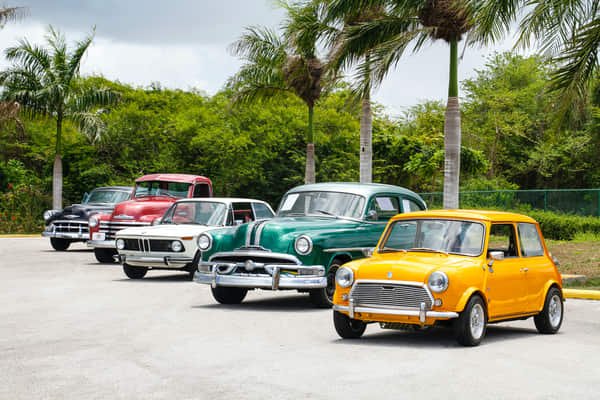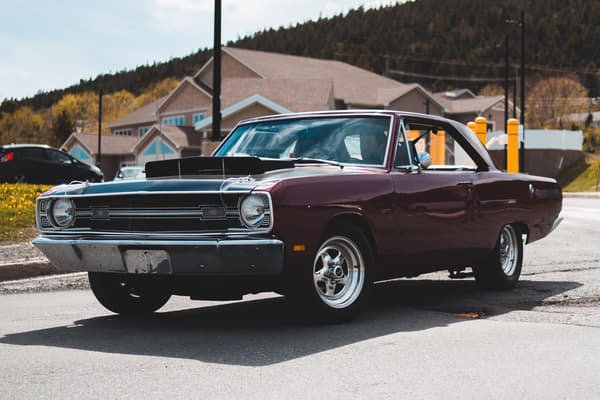Whether you want to buy a classic car you dreamt about in high school, plan to restore one to mint condition, or purchase one for profit; you need to be aware of certain aspects to get the best classic car under your budget. One of the few questions to ask when buying an old school machine is why you are purchasing it.
According to a study, the global classic car market is projected to grow steadily from roughly 30.9 billion U.S. dollars in 2020 to some 43.4 billion U.S. dollars in 2024. It totally makes sense to purchase one before the market touches the sky.
How to Buy a Classic Car? A Beginner’s Guide
It doesn’t matter whether you want to get an American classic or a German antique. These are all the factors to consider before buying a vintage vehicle.
Determine How do you Want to Use Your Classic Car!
Will you drive the classic daily or just on weekends? Will it be a “toy” for seasonal joyrides and show at events? Understanding the purpose of your classic will enable you to find the perfect car – practical and conventional or joy and glamorous.
Attend Classic Car Shows
It is wise to find and attend classic car shows in your country to check out different makes and models. These events offer you an excellent opportunity to indulge in conversation with seasoned classic car owners. You can benefit from their advice and opinion and ask them what to look for when buying a classic car, according to your needs.
Become a Member Of a Classic Car Club
It is prudent to become a member of a local classic car club or join a famous online club to get more details about the iconic car you want to purchase. The classic car owners in these clubs have first-hand knowledge of maintenance and upkeep expenses. They know how much work a classic car requires to become street legal. Furthermore, it is possible that a member of the club may have previously possessed the vehicle you desire to keep.
Most classic vehicles demand thousands of dollars for repairs, replacements, and upkeep over the years. So, knowing these expenses will help you shortlist the classic car you should purchase.
Where to Buy Classic Car – Auction, Dealer vs. Private Seller
Buying a classic car is not like shopping for a new Toyota from your local showroom. You go there and choose the color, engine, and package you like and drive away in your new car. Buying a 1970 classic is a different story altogether.
1. Purchasing a Classic Car at Auction
Buying a classic car from an auction has its own appeal – the crowd, the glamour, and the possibility of getting your dream machine. That said, it has its pros and cons:
Pros:
- What you can find in an auction might not be available at a dealer’s lot or from a private seller. Auctions bring you the highly desirable and expensive iconic cars.
- You do not have to be in the Land of the Rising Sun or the Old Continent to buy a classic. You can purchase it online from any part of the world.
- You may be lucky to get away with a cheap classic car if only a few shoppers bid on the vehicle with a low or no bid.
Cons:
- You cannot test-drive the car at auction; all you can do is just look at it. You can only find the issues with it after your purchase, and you cannot just cancel the deal.
- The seller and buyer premiums may raise the price by 10-25%. You do not pay a single dime to a private classic car seller.
2. Acquiring a Classic from a Dealer
The market is full of good and bad dealers, so choose yours wisely. The majority have a consignment shop, allowing private classic vehicle sellers to display their automobiles in their yards for sale. Such a classic car dealership gets a percentage of the sale for managing the advertising and encouraging buyers. Some dealers even purchase the vehicle directly from the sellers and sell it for increased profit.
Pros:
- A reputable dealership displays a classic like Lil’ Red Express Truck after proper inspection. It allows buyers to examine the vehicle thoroughly and even encourages them to bring an outside vehicle inspector for inspection.
- Another advantage of buying a classic car from a dealer is the bargaining power you gain. You can drive the price down as per your budget, and the dealer will ask the seller to come to your terms. They try from both ends to get the deal done.
Cons:
- Since dealerships do not have familiar knowledge of different classics, you should not be confident of what they tell you about a certain exotic.
- Dealers act as middlemen and earn a 10-15% commission on the total price from the seller. It means you have to pay extra for the dealer’s commission as well.
3. Procuring a Classic from a Private Party
Perhaps, one of the best methods of buying a classic is to contact a private seller directly. It is undoubtedly less laborious than purchasing from a dealership or auction but requires extensive research.
Pros:
- Dealing directly with the seller who has owned the vehicle for a long time would work in your favor. He will give you the complete history of the vehicle, and you might be able to drive down the price by making them believe you would care about the vehicle as much as they do.
- You will save money you have to pay to a dealership or an auction house.
Cons:
- You will need to search all the classic cars classified online, and that would require patience. Most sellers only advertise on 1 or 2 websites, so make sure you check all sites and ads.
- You might get ripped off by an enthusiastic private seller if you are uneducated and do now know the classic car buying secrets.
Take Services of an Inspector if Possible
It is wise to hire an inspector when dealing with a dealership or a private seller. He will ensure the classic you are buying is 100% according to the advertisement. The examiner will also make sure you do not get overexcited and buy a classic car that requires lots of work and money for repairs and restoration.
You can hire an expert inspector by getting suggestions from a local car club or a classic car dealer. You may also contact a restoration shop dealing in the vehicle you want to buy and hire them for examination. Even if they do not have an expert, they should be able to recommend to you someone who could.
A Suitable Insurance
The insurance firms are infamous for either overvaluing or underrating your classic. They assume you will drive fewer miles and permanently preserve your vehicle in the best shape possible. Do not just say yes to the first policy they present to you. Rather, ask them to create a plan that works for both parties. The right insurance is the one that covers spare parts and offers protection in case of damage or theft.
Classic Car Inspection Checklist
If you cannot hire an inspection service, you should know how to inspect a classic car to avoid buying a dud.
- Clear title: Find out if the vehicle is registered or not. You have to pay to find the car owner and apply for a new title.
- VIN: Ensure the Vehicle Identification Number (VIN) on the title corresponds to the VIN on the vehicle. In case they mismatch, it is likely the car is accidental, the title is fake, or the vehicle was stolen. The U.S. government standardized VIN in 1981, and the VIN’s length on old cars may vary for different automakers.
- Interior: A classic with its genuine interior is the best bet. Find out whether the seats, upholstery, emblems, and dashboard are in original condition or not. If not, you have to spend a lot of money to restore them.
- Exterior: It is prudent to inspect the classic in sunlight to find cracks, dents, and misaligned panels. Look for welding points and structural damage.
- Rust damage: We should expect minor rust, but a full rusty floorboard and body panels are a warning sign. If there are hints of repair or replacement, make sure the repairer has amended them ideally. Otherwise, the rust can return anytime.
- Test drive: If the car is street legal and safe to drive, take it for a test drive. Be cautious of out-of-the-ordinary noises, screeches, and thumps. If the classic is loose around the corners and bumps extensively, know its suspension requires work.



